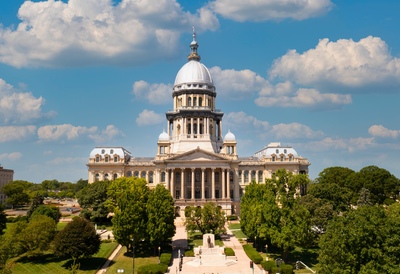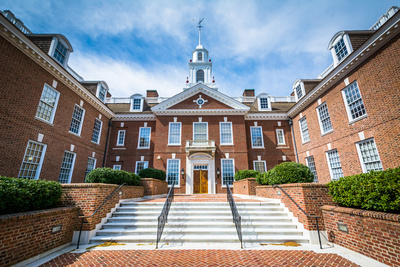April was a busy month for state legislators, but the biggest news in tax policy was the fate of a pair of bills seeking to impose new gross receipts taxes (GRTs). The governors of Louisiana and West Virginia have both advocated for a GRT believing that a GRT will help close their states' budget shortfalls without raising taxes on middle class citizens. Unfortunately for these governors, lawmakers have not bought these arguments and both of these bills now appear to be dead.
Louisiana
Details of Governor John Bel Edwards' (D) tax plan had been sketchy since its
surprise announcement in March, but from the outset lawmakers were skeptical of the shakeup that a GRT would bring to the state's business tax code. When Governor Edwards finally unveiled the
bill's specifics on March 29, their fears were not allayed. As introduced, the bill (
LA HB 628) levies a 0.35 percent gross receipts tax (referred to as a Commercial Activities Tax, or CAT) for most businesses with more than $1.5 million in annual revenues and also imposes an alternate minimum tax for the corporate income tax (MCAT) that is levied at fixed dollar amounts based on a company's gross receipts.
GRTs are generally disfavored by the tax policy community for their complexity and their economic distortions, but observers and experts found this version particularly troubling because of its unique level of complexity. The Tax Foundation wrote a
report about the numerous sub-clauses that a business would have to wade through to determine its tax base and the rate that would be applied. It's so complex that the paper's authors dubbed it the “
Choose Your Own Adventure Tax.”
The governor tried to sell his plan as a way to level the economic playing field while respecting the fact that voters have no appetite for income tax hikes. He also pointed to his state's long-term fiscal imbalance as a sign that legislators could not just cut their way out of the problem and that overhauling the tax code was the necessary next step. But legislative leaders were resistant to his plan, with majority Republicans
wary about pursuing tax reform at all, let alone something as sweeping as the governor's plan.
The situation came to a head when the bill came up for its first vote in the Ways and Means Committee on April 25. Prior to the vote, lawmakers were
signaling that the measure lacked even a modicum of support and that it was going to fail badly. Faced with this political reality and a
discouraging fiscal note, the bill's sponsor decided to withdraw rather than face a losing vote.
At this point the policy could come up again (a separate bill,
LA HB 666, is still alive and would levy an even more aggressive GRT), but given this initial failure and the political climate in Baton Rouge it's unlikely the idea will progress.
The question now is: How will lawmakers go about closing the state's daunting revenue shortfall? Currently, numerous other tax reform bills are under consideration, but we can't know at this point which, if any, will gain traction.
West Virginia
In the final weeks of their regular legislative session, West Virginia lawmakers worked in a flurry to craft a budget that could close the state's nearly
half a billion dollar revenue shortfall. Early in the session, Governor Jim Justice (D) unveiled a plan to close to close this gap primarily by levying a new gross receipts tax paired with an expansion of the sales tax, but, as we
reported last month, his bill (
WV HB 484) was amended by the legislature to remove both of these proposals.
Despite the setback, Justice continued to push his plan, saying that it would get the state back on its feet without raising taxes on the West Virginia's middle class. Legislators in both chambers also tinkered with tax reform ideas but were never able to coalesce around any specific set of ideas, with each proposal softening as lawmakers struggled to find set of policies that could gather sufficient support from members in both chambers.
The situation
came to a head over the weekend of April 8. Lawmakers hoped that they could finalize negotiations on a revenue package in order to pass a bill before the legislative session's time ran out on Sunday night. While legislators hoped that the pressure would spur the process along, the negotiations deteriorated further. Coalitions of legislators formed and then dissolved around a variety of tax proposals, but in the end no consensus was reached.
Needing to pass
something, the legislature approved a threadbare budget without any of the previously discussed tax reform elements, but this left the two legislative chambers divided about what should happen next. House leadership urged the governor to abandon tax reform entirely and enact the passed budget, saying that West Virginians did not have the appetite for tax increases. The Senate, by contrast, hoped to reinvigorate negotiations in order to achieve their tax reform priority: a personal income tax cut paid for by expanding the sales tax base.
Within days, however, Senate leadership abandoned its position when it became clear that the governor would not negotiate away many of the controversial portions of his tax reform agenda, particularly the gross receipts tax, so they too urged the governor to sign the existing spending plan. Despite legislative leadership urging the governor to sign the budget as passed, Governor Justice announced on April 13 that he would veto it and continue to push for his policies. Using an actual pile of
animal feces as a prop, he said that the legislature's budget was a “bunch of political bull you-know-what.”
Not surprisingly these theatrics did little to bridge the divide and the budgetary talks continued to flounder. On April 26, Governor Justice
announced that he would call the West Virginia legislature back into special session on May 4, though he remained hazy on the details of a compromise tax package. He said only that the final bill would include a 1 percent increase to the sales tax rate, a "modest business tax," a 4.5 cent increase to the gas tax, and cut to the personal income tax rate.
Following this, Senate President Carmichael praised the governor saying that he thought the parties had come to a good compromise that would amount to a "substantial tax cut for West Virginia citizens."
House Speaker Armstead (R), however,
did not share in the enthusiasm and said that the votes are not there in the House to pass tax reform. He also decried negotiations, saying that he and his colleagues were locked out of the process, which could lead to a prolonged special session and a possible government shutdown.
-000055-400px.jpeg)
-000055-400px.jpeg)

